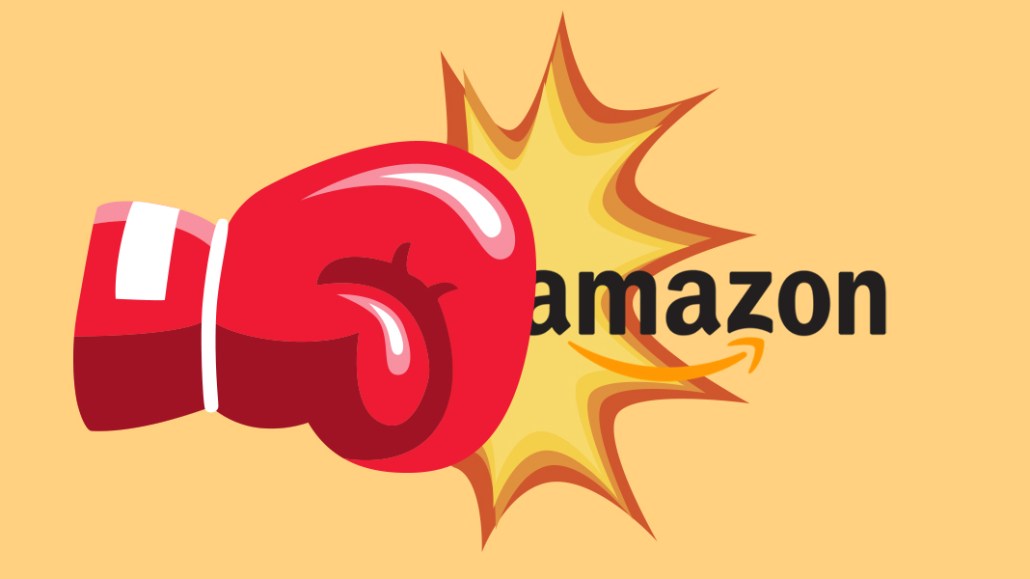Secure your place at the Digiday Media Buying Summit in Nashville, March 2-4
End of an era: Amazon’s 1-click buying patent finally expires

Get your pointer fingers ready: Amazon’s one-click buying process, patented by the Seattle-based company back in the heady days of 1999, expired on Tuesday. And retailers, which until now have either had to not use one-click buying or pay Amazon licensing fees to do so, might be looking to capitalize.
The Amazon 1-Click button lets customers buy things with just one click without having to enter and re-enter billing, payment or shipping information. In the last couple of decades, it has become a major part of Amazon’s checkout process, being extended to other Amazon products like Dash, which was essentially one-click ordering via a small button, and Echo, where customers can buy things with one voice command.
Amazon fiercely protected the 1-Click patent, suing Barnes & Noble for implementing a similar technology back in the late ‘90s and licensing it out to companies including Apple. Amazon CEO Jeff Bezos even wrote a letter in 2000 that defended Amazon’s patents, opening with, “I’ve received several hundred e-mail messages on the subject of our 1-Click ordering patent. Ninety-nine percent of them were polite and helpful. To the other one percent — thanks for the passion and color!”
The big problem one-click buying eliminates is shopping-cart abandonment. It’s an issue both on mobile and desktop and can represent major revenue losses for retailers. The average shopping cart abandonment rate is about 70 percent, according to a number of studies done this year.
While it’s unclear how much money 1-Click brought Amazon, one estimate, which assumed the technology increased Amazon sales by 5 percent, valued the patent at $2.4 billion annually.
“Amazon sets the standard for e-commerce experiences,” said Eric Mayville, co-founder at ad agency Wondersauce, which works for retail clients including DKNY and Bombas. Mayville pointed out that Shopify, for example, has tried to mimic 1-Click with a workaround where if you buy something on one site, for instance, it’ll recognize you on another. Still, it’s not foolproof.
“For Bombas, for example, even if you only buy socks once in a while, the fact that you can’t buy with a single click isn’t great,” said Mayville. “Getting something like 1-Click in place is definitely important, but Amazon is looking toward things like predictive AI to figure out when you’re going to run out of toilet paper and send you another dozen rolls proactively. So 1-Click would be table stakes in the big picture for brands that have routine or even seasonal purchase repetition like Bombas.”
It’s certainly on the wish list for most retailers. One retailer that declined to speak on the record said he’s finding a large percentage of orders being lost because the process after clicking “purchase” or “add to bag” is too long. He hopes he can now implement one-click buying on his site. And if e-commerce providers like Demandware or Shopify can add one-click payments to their offerings for retailers, it would be a marked improvement in conversions, executives said.
At Shopify, the company is focused on accelerating the checkout flow, said Mohammad Hashemi, director of product and payments. The company didn’t elaborate on whether it plans to implement one-click buying but said it recently developed its own accelerated payment feature, called Shopify Pay, which makes checkout completion 40 percent quicker.
Many retail executives also say one-click payments could be especially beneficial for retailers that sell slightly smaller-ticket items, like in online grocery. “It could potentially be beneficial in online grocery, where consumers are pantry loading and buying things they need every week instead of browsing for product info,” said Angela Edwards, vp of marketing and client services at conversion marketing agency Catapult.
Others, including Amazon competitors, have already noticed the 1-Click patent’s expiration. Last year, a group of companies in the alliance known as the World Wide Web Consortium, including Apple, Facebook and American Express, started working on standards to implement one-click purchasing. Google is also reportedly working on a one-click payment solution.
More in Marketing

Future of Marketing Briefing: AI’s branding problem is why marketers keep it off the label
The reputational downside is clearer than the branding upside, which makes discretion the safer strategy.

While holdcos build ‘death stars of content,’ indie creative agencies take alternative routes
Indie agencies and the holding company sector were once bound together. The Super Bowl and WPP’s latest remodeling plans show they’re heading in different directions.

How Boll & Branch leverages AI for operational and creative tasks
Boll & Branch first and foremost uses AI to manage workflows across teams.








